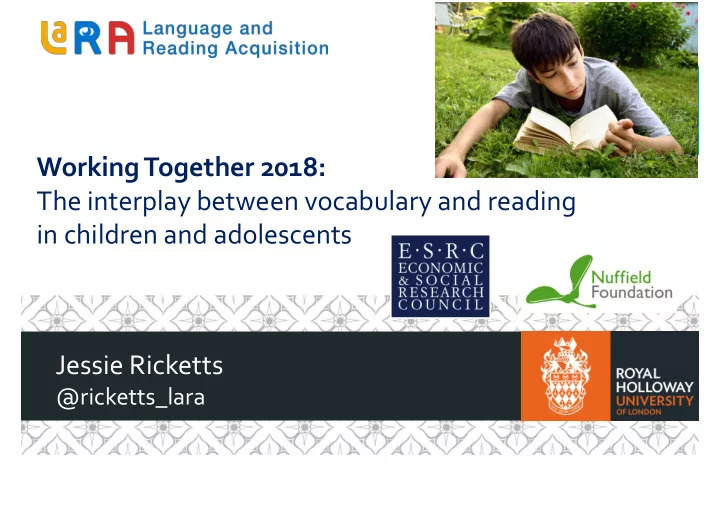

Department of Psychology Working Together 2018: The interplay between vocabulary and reading in children and adolescents Jessie Ricketts @ricketts_lara
Royal Holloway What underpins reading success? Department of Psychology Simple View of Reading (Gough & Tunmer, 1986)
Royal Holloway What underpins reading success? Department of Psychology Educational Endowment Foundation KS2: https://educationendowmentfoundation.org.u k/tools/guidance-reports/literacy-ks-two/ Reading Rope (Scarborough, 2001) 3
Royal Holloway What underpins reading success? Department of Psychology Reading Systems Framework (Perfetti & Stafura, 2014) 4
Royal Holloway Vocabulary and Reading: Reciprocity Department of Psychology � Vocabulary knowledge is important vocabulary reading � Vocabulary (and spoken language more broadly) and foundational reading skills increasingly downplayed in curriculum from upper primary (KS2) • Accessing the curriculum • Expectations of independence: ‘reading to learn’ • Exam performance 5
Royal Holloway Plan for today Department of Psychology � Vocabulary and Reading in Secondary Schools (VaRiSS) project • Adolescence: Early secondary (KS3) • Vocabulary and reading development • Relationship between vocabulary and reading � Reading and Vocabulary (RAV) project – just beginning… • Transition from primary to secondary (KS2 → KS3) • How does reading impact on vocabulary? 6
Royal Holloway The VaRiSS project Department of Psychology Phase 1 Phase 2 Phase 3 12.01 yrs (.33) 13.07 yrs (.34) 14.01 yrs (.33) N = 208 N = 195 N = 186 48.6% girls 49.7% girls 48.4% Measures: � Oral vocabulary pump, chicken cough, cello � Word reading delk, seldent � Reading comprehension 7 what does summer mean?
Royal Holloway Development: three separable processes Department of Psychology � First longitudinal study tracking progress within adolescence � Growth: Is there progress over time? � Stability (Bornstein et al., 2014; 2016): Does pecking order stay the same over time? � Spread: Is there evidence for Matthew effects (Pfost et al., 2014; Stanovich, 1986)? Compensation? 8
Royal Holloway Word reading (accuracy) Department of Psychology average bottom 10% Age-appropriate performance on average: M ≈ 100, SD ≈ 15 • Significant growth (small but functionally relevant?) • Very high stability • Gap narrows • Same pattern for reading comprehension and vocabulary 9
Royal Holloway Development and change Department of Psychology � Growth: YES Word reading (accuracy) � Stability: YES � Spread: narrowing (but not closing) gap Reading comprehension Oral vocabulary (BPVS) � Poorest performing 10-20%: • not exceeding levels of the average 9 year old (but 12 – 14 years) • can‘t assume they can access the curriculum, will constrain outcomes 10
Royal Holloway Relationship between vocabulary and reading Department of Psychology vocabulary reading � Do we see reciprocal relationships between vocabulary and reading comprehension in adolescence? � Childhood (Verhoeven et al., 2011 but see Quinn et al., 2015) � Only one study in adolescence (Reynolds & Turek, 2012) • Vocabulary → reading comprehension 11
Royal Holloway Relationship between vocabulary and reading Department of Psychology reading vocabulary comprehension no reading vocabulary comprehension no vocabulary Oral vocabulary and reading comprehension and reading indistinguishable comprehension 12
Royal Holloway Summary Department of Psychology � Poorest performing 10-20%: • not exceeding levels of the average 9 year old (but 12 – 14 years) • can‘t assume they can access the curriculum, will constrain outcomes � Significant growth (but commensurate with test norms) • small in real terms but may be functionally important • clearly learning new information (e.g. subject-specific vocab) � High stability: rank order also preserved � Evidence of compensation: narrowing of gaps (but not closing) � Vocabulary and reading comprehension inextricably linked 13
Royal Holloway Plan for today Department of Psychology � Vocabulary and Reading in Secondary Schools (VaRiSS) project • Adolescence: Early secondary (KS3) • Vocabulary and reading development • Relationship between vocabulary and reading � Reading and Vocabulary (RAV) project – just beginning… • Transition from primary to secondary (KS2 → KS3) • How does reading impact on vocabulary? 14
Royal Holloway The RAV project Department of Psychology � Oxford Language Report (2018): teacher views • Vocabulary is a barrier for many • Word gap is increasing • We need more support, especially in upper primary and secondary • Resonates with last year’s workshop � How can reading support vocabulary learning? • Written text contains a richer and more varied vocabulary than oral language • Avid readers are exposed to a more diverse range of words • More able readers are better at using text to learn new words oxford.ly/wordgap 15
Royal Holloway Longitudinal study Department of Psychology Aston Literacy Project (complete) � Pilot data (Year 5): more reading activity and reading ability associated with greater vocabulary knowledge • After accounting for school entry) • Support both reading ability and encourage reading activity • Supporting reading ability will also promote reading activity 16
Royal Holloway Experimental study Department of Psychology This afternoon’s workshop � Use SMS-feedback to encourage reading activity • Based on established SMS-feedback interventions � Questions: • Increased reading activity → increased vocabulary progress? • More able readers → more vocabulary progress? • Both? � Should we intervene to support reading activity, reading ability, or both? 17
Royal Holloway Thanks and acknowledgements Department of Psychology � To you for listening! � Pupils, teachers and schools: � Collaborators: • VaRiSS: Nicky Dawson, Charles Hulme, Arne Lervåg • RAV: Laura Shapiro, Adrian Burgess, Sanne van der Kleij � LARA lab: http://pc.rhul.ac.uk/sites/lara/; @ricketts_lara � VaRiSS project: www.variss.org; @varissproject; www.facebook.co.uk/varissproject � ALP/RAV project: http://www.aston.ac.uk/alp/ 18
Recommend
More recommend